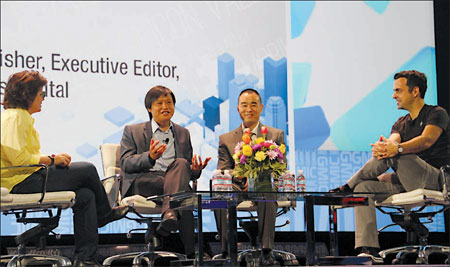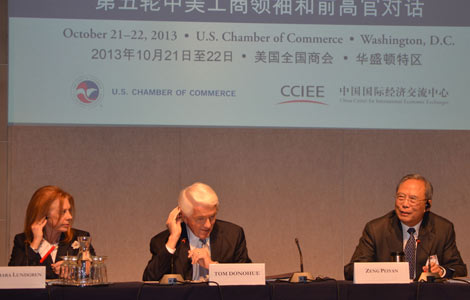Mobile giants talk future in Frisco
Updated: 2013-10-24 06:13
By YU WEI in San Francisco (China Daily)
|
||||||||
|
|
| Video by Yu Wei/China Daily. Click to watch on Youtube |
The 2013 Global Mobile Internet Conference (GMIC) took place on Tuesday at Moscone Convention Center in San Francisco, as mobile leaders and innovators gathered to discuss the latest trends and future opportunities in one of the fastest growing markets.
As Silicon Valley's largest mobile conference, the event drew more than 10,000 attendees, 220 speakers from more than 60 countries this year, including leaders of some of China's tech titans.
"We have spent close to $20 billion of investment outside China," said Martin Lau, president of Tencent, China’s biggest internet company with a market value of more than $100 billion.
Lau said Tencent’s future international strategy has two parts — investing in the right companies abroad and promoting its own product abroad.
"We go out and search for teams and entrepreneurs, companies we like and we provide capital, service and experiences. In some cases, we provide them with access to the China market,"Lau said. "We try to add value to those entrepreneurial companies. We try to empower them and benefit from their growth."
Lau explained the thinking behind Tencent’s launching of the sister products WeChat and Wexin. "The two have different services but are interconnected, so people on the two networks can actually talk to each other," he said.
The target countries for WeChat now include Europe, Mexico, Brazil and Argentina, he said. "The US is a tough market, but we do have an office here, we do have a team, and we try to think about what we can do differently here," he added.
Another Chinese speaker at the conference was Lei Jun, CEO of Chinese smartphone maker Xiaomi.
|
Lei Jun (second from left), founder and CEO of Xiaomi, interviewed at the GMIC on Tuesday, with Hugo Barra (right), vice-president of Xiaomi global. Yu Wei / China Daily |
"We believe Xiaomi’s business model has great opportunities outside the Chinese mainland," Lei said. "This year, we did a test in Taiwan, which proved to be very successful.
"When we enter a new market, we first take our business characteristics(direct-sales model)into consideration. So we are looking for countries that have the most well-developed ecommerce," Lei said.
"The second criteria we are looking for is the development of social media. We have such active fans, so we need really active social media to support them," he added.
Sharing the stage with Lei was Hugo Barra, vice-president of Xiaomi global and former vice-president of Android product development at Google.
"Hugo is a very smart person and his hiring will help us reach very good product," Lei said. "Xiaomi is aiming to be a global company and in order to achieve that, we need top talent from around the world. We believe Hugo is truly the very first international talent who joined Xiaomi."
Many observers see the company's recent move of hiring Barra away from Google to head its international business development division as a sign that Xiaomi is gearing up to grow beyond China.
However, the country Xiaomi wants to tap into next was not revealed by either Lei or Hugo. While the US would be a key market for Xiaomi’s international ambitions, there are no immediate plans for the company to go rushing in there.
"We want to enter the US, but only when we are ready," Lei added.
Yu Yongfu, CEO of Chinese mobile Internet browser company UCWeb, sounded more aggressive about his company’s overseas expansion plans.
During his speech — entitled A New Ecosystem in the Mobile World — Yu announced a new partnership with Amazon based on UCWeb’s plug-in platform.
Founded in 2004, UCWeb’s flagship product UC Browser has grown to having 400 million users worldwide. It is a dominant third party mobile browser in China, with more than 50 percent market share as well as the number one mobile browser in India, where it has a 30 percent market share.
"UCWeb is an active player in the strategic investment of the mobile Internet industry chain," Yu said. "In the past few years, we have invested in more than 20 mobile Internet entrepreneurs.
"In the future, we will increase support for mobile Internet entrepreneurs in the US. We would help those US entrepreneurs who have global vision to quickly access the Asian markets," he added.
Most Viewed
Editor's Picks

|

|

|

|

|

|
Today's Top News
Walmart China strategy: 110 new stores
China's GDP growth to 7.6%: Standard Chartered
Scholar looks at the kung fu-hip hop connection
Starbucks' pricing furor: tempest in a coffee pot
100,000 Strong student exchange picks first partners
Report: China could profit rebuilding US
Holiday may boost sales of new iPads
US-China trade talks a 'turning point'
US Weekly

|

|
















